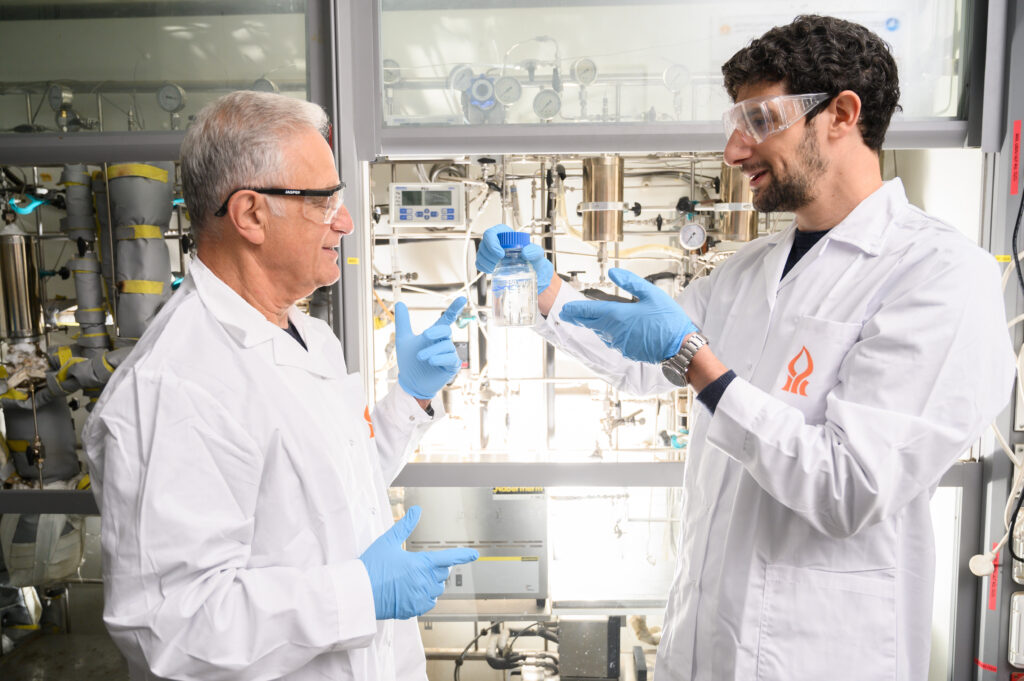
ExxonMobil Partners with Ben-Gurion University to Commercialize On-Vehicle Hydrogen Fuel System
ExxonMobil Partners with Ben-Gurion University to Commercialize On-Vehicle Hydrogen Fuel System
July 11, 2008
Alternative Energy, Press Releases
NEW YORK, NEW YORK — November 15, 2007 — ExxonMobil Corporation (NYSE:XOM) today announced it is partnering with QuestAir Technologies, Plug Power Inc. and Ben-Gurion University of the Negev (BGU) in Israel on plans to commercialize an on-vehicle hydrogen production system for use in a fuel cell-powered lift truck application.
The on-vehicle system was developed in partnership with the Blechner Center for Industrial Catalysis and Process Development at BGU. The Center serves as a link between industry and academic research, supporting researchers in developing their inventions into commercially valuable products.
Under the arrangements, Plug Power will seek to commercialize unique technologies developed by ExxonMobil, QuestAir Technologies and BGU that take liquid fuels — gasoline, diesel, ethanol or biodiesel — and convert them into hydrogen onboard the vehicle where it will be used in a fuel cell power train.
“By developing a system that converts liquid hydrocarbons into hydrogen directly on a vehicle without the need for storage, we hope to demonstrate significant infrastructure, logistics and cost advantages compared to other hydrogen vehicle systems, all while reducing the impact on the environment,” said Dr. Emil Jacobs, vice president of research and development at ExxonMobil Research and Engineering.
“There is a long road ahead before this technology could be deployed on a mass scale in passenger vehicles, but it has the potential to be up to 80 percent more fuel efficient than today’s internal combustion engine technologies and reduce CO2 emissions by up to 45 percent. The use of this technology in a practical, commercial setting such as in a lift truck application is an important early step in demonstrating the potential benefits this technology may hold in the long-term,” Jacobs said.
Most prototype hydrogen vehicles on the road today are powered by highly-compressed or liquefied hydrogen that is delivered to distribution points and then stored at high pressures on-board the vehicle. For these vehicles to be widely adopted a significant hydrogen generation and delivery infrastructure must be developed. As the ExxonMobil system uses conventional fuels and produces hydrogen on demand, no such infrastructure or on-board storage would be necessary.
“With ExxonMobil’s research leadership, and the technical capabilities of our partners, we found a way to scale down the traditional hydrogen steam reforming process so that it will fit on a vehicle and connect to a fuel cell,” said Dr. Jacobs. “Since this system does not require changes to fuel delivery infrastructure – unlike compressed hydrogen fuel systems – this overcomes one of the key challenges manufacturers face in developing hydrogen vehicles for potential consumer use.”
Today’s announcement follows several years of work by ExxonMobil, QuestAir Technologies and BGU to develop the individual components that make up the on-vehicle hydrogen fuel system. The system promises high efficiency, quick startup time, and reduced CO2 emissions versus today’s vehicles. The on-vehicle hydrogen fuel system comprises an advanced reformer developed by ExxonMobil and hydrogen separation using QuestAir Technologies’ Rapid Cycle Pressure Swing Adsorption system.
Sulfur is controlled by an ExxonMobil proprietary S-Trap developed in conjunction with BGU. Plug Power will be responsible for integrating the fuel system with its GenDrive® fuel cell power system for lift truck applications. GenDrive power units allow users in large distribution centers or manufacturing facilities to increase productivity and reduce operating costs through a quick refueling process that eliminates the need to change batteries repeatedly throughout the day. GenDrive also eliminates the environmental and safety issues traditionally associated with lead-acid batteries.
About ExxonMobil
ExxonMobil is the world’s leading non-governmental petroleum and petrochemical company. The company has consistently led the industry in research and development, and is one of the world’s largest producers of hydrogen through its global network of refineries.
About QuestAir Technologies Inc.
QuestAir Technologies, Inc. is a developer and supplier of proprietary gas purification systems for a number of significant international markets, including existing markets such as oil refining, bio-gas production, hydrogen generation, hydrogen recovery and natural gas processing, as well as emerging markets such as fuel cell vehicle refueling stations. QuestAir is based in Burnaby, British Columbia and its shares trade on the AIM Market of the London Stock Exchange Plc. and on the Toronto Stock Exchange under the symbol “QAR.”
About Plug Power
Plug Power Inc. (NASDAQ:PLUG), an established leader in the development and deployment of clean, reliable, on-site energy products, integrates fuel cell technology into backup and primary power products for telecommunications, material handling, utility and uninterruptible power supply applications. The company is actively engaged with private and public customers in targeted markets throughout the world, including North America, Europe, the Middle East, Russia, South Africa and South America.
ABOUT AMERICANS FOR BEN-GURION UNIVERSITY
By supporting a world-class academic institution that not only nurtures the Negev, but also shares its expertise locally and globally, Americans for Ben-Gurion University engages a community of Americans who are committed to improving the world. David Ben-Gurion envisioned that Israel’s future would be forged in the Negev. The cutting-edge research carried out at Ben-Gurion University drives that vision by sustaining a desert Silicon Valley, with the “Stanford of the Negev” at its center. The Americans for Ben-Gurion University movement supports a 21st century unifying vision for Israel by rallying around BGU’s remarkable work and role as an apolitical beacon of light in the Negev desert.
About Ben-Gurion University of the Negev
Ben-Gurion University of the Negev embraces the endless potential we have as individuals and as a commonality to adapt and to thrive in changing environments. Inspired by our location in the desert, we aim to discover, to create, and to develop solutions to dynamic challenges, to pose questions that have yet to be asked, and to push beyond the boundaries of the commonly accepted and possible.
We are proud to be a central force for inclusion, diversity and innovation in Israel, and we strive to extend the Negev’s potential and our entrepreneurial spirit throughout the world. For example, the multi-disciplinary School for Sustainability and Climate Change at BGU leverages over 50 years of expertise on living and thriving in the desert into scalable solutions for people everywhere.
BGU at a glance:
20,000 students | 800 senior faculty | 3 campuses | 6 faculties: humanities & social sciences, health sciences, engineering sciences, natural sciences, business & management, and desert research.
For all press inquiries, please contact:
James Fattal, J Cubed Communications
516.289.1496



